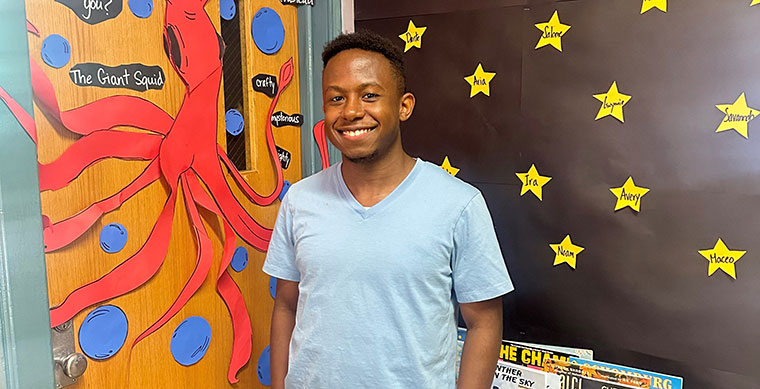
“For my thesis, I meshed my passion for storytelling and interests in literacy. I knew I wanted to concentrate on storytelling in the classroom, its potential as a great bonding agent to pull the classroom community together.””
Malik Torres ‘21, MSEd ‘22 almost missed his calling. The undergrad who loved working with children and spent his free time volunteering at community centers had been set on several different careers during his time at Sarah Lawrence; education just wasn’t one of them. That changed with the onset of the COVID-19 pandemic. Malik, who had been studying abroad in Germany, realized that “the realm of education, its politics, its influence in cultivating the next generation of citizens would not only be an intellectually rigorous endeavor but also a spiritually enriching one.” With the support of his family and professors, Malik successfully applied for the Art of Teaching Five Year Program. Many, many Zoom classes later, Malik finds himself again in the classroom - this time, as a grade 3 integrated, co-teaching (ICT) teacher at a progressive, public school in Manhattan.
How did your time at Sarah Lawrence prepare you for the work you’re doing now?
My time at Sarah Lawrence helped to build the philosophical backbone which frames my values as a teacher. Sarah Lawrence’s dedication to progressive education—inquiry-based learning, antiracist practices, inclusivity, and play—shape the pillars of that philosophical foundation. My education at Sarah Lawrence not only instilled these values within me, but also gave me the room to turn theory into practice.
Is there a course, faculty member, or fieldwork placement that particularly influenced you?
At Sarah Lawrence, we read theory voraciously and have lively conversation parsing through it all, but knowing theory is only the first step in being an educator. At [my fieldwork placement], I got the chance to turn progressive theory of education into praxis in a New York City public school. At the Ella Baker School, my student teacher experience was in a kindergarten classroom for the fall semester, and then a multiage 4th and 5th grade classroom in the spring. There I had two wonderful host teachers, whom I can now say are dear colleagues of mine, who helped nurture my own praxis as an educator, amongst the host of phenomenal courses and professors I had at Sarah Lawrence.
What was the dynamic of your cohort?
The dynamic of our cohort was very warm and close-knit despite being in the middle of the COVID-19 Pandemic. We often met after classes, studied with one another, had dinner, and chatted about our future as teachers. To this day, we are all still close. Everyone is still teaching, most teaching in an early childhood setting. I’m happy to say we all meet a few times yearly to catch up.
What was your Oral Thesis about and why did you choose this topic?
My Oral Thesis, “Our Children, Their Stories—Storytelling in the Classroom”, was an exploration in the “narrative classroom,” a space in which storytelling, or as Vivian Paley would put, “play in narrative form,” is the largest medium for learning. For my thesis, I meshed my passion for storytelling and interests in literacy. I knew I wanted to concentrate on storytelling in the classroom, its potential as a great bonding agent to pull the classroom community together. For me, classroom community is as vital as children learning their times tables, and so I wanted to place an emphasis on this and connect it to literacy endeavors in the classroom.
What are some of the connection points available to alumni of the program?
Saturday Seminars hosted by the program is a time where alumni of the program can meet and discuss particular themes in education. It is also a great time to “reset” and be among like-minded educators who have similar progressive values as your own. I found this space highly beneficial during my first year of teaching, for it provided a space for information-pooling, networking, and a time to meet with my dear friends from my graduate cohort.
What advice would you give to a prospective student?
When you enter the education workforce, remember to stick to the values you cultivated at the Art of Teaching. I’m lucky to be in a public school which upholds progressive values, but not every educator is so lucky. More likely than not, you will be placed into a school where your values might differ with other teachers or administrators and even both. Stay the course and find the one colleague in your workplace with whom you can confide. It’s not enough to cultivate your values through theory and praxis, but you must also fight for them as well.